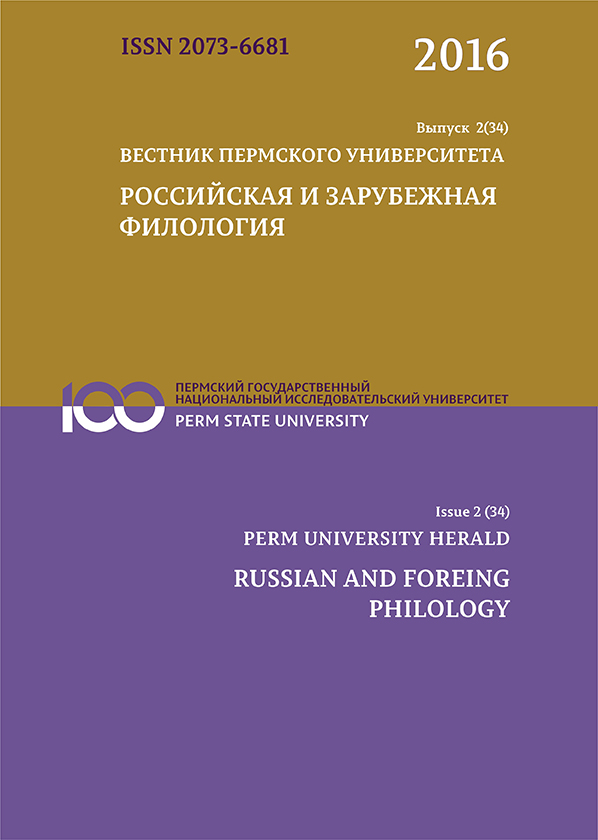EVOLUTION OF THE GENRE OF SCHOOL STORIES IN RUSSIAN LITERATURE OF THE 20th CENTURY
DOI:
https://doi.org/10.17072/2037-6681-2016-2-128-134Keywords:
school story, Bildungsroman, genre, plot, chronotope.Abstract
The article covers the evolution of the school stories genre in Russian literature of the 20th century. The authors compare the genres of school story and Bildungsroman, identify differences between them and consider periods in the evolution of the former. The analysis of the most important texts of this genre makes it possible to characterize changes not only in the genre structure but also in the system of characters, as well as it helps to reveal the genre elements which have become stable. In school stories of the 20th century, the authors trace traditions typical of the 19th century Russian literature, reveal features characteristic of all school stories, review attempts having been made to work out the typology of the genre, which demonstrates the main types of conflicts represented in such fiction. Dynamics of the system of characters, chronotope, problematic and an author’s opinion are considered. Analyzing stages in the genre evolution, the authors give an overview of how Russian writers exploited school theme in the 20th century.References
Аркус Л. Приключения белой вороны: Эволюция «школьного фильма» в советском кино // Сеанс. 2010. 2 июня. URL: http://seance.ru/ blog/whitecrow/ (дата обращения: 2.12.2013).
Бурдина С.В., Мокрушина О.А. Изображение школы в русской литературе XIX века: основные тенденции // Вестник Пермского университета. Российская и зарубежная филология. 2014. Вып. 2 (26). С. 99–108.
Бахтин М.М. Роман воспитания и его значение в истории реализма // Эстетика словесного творчества. М., 1979. 423 c.
Бочаров А. «Перпетуум-мобиле» Владимира Тендрякова. О повести «Ночь после выпуска» // Литература и современность. 1974–1975. № 14. М.: Худож. лит., 1976. С. 324–332.
Воловинская М.В. Образ двоечника в советской литературе для детей середины ХХ века // В измерении детства. Пермь, 2008. С. 138–143.
Габбе Т.Г. О школьной повести и её читателе // Детская литература. 1938. № 18–19. С. 33–41.
Железников В.К. Чучело. М: Астрель; АСТ; Владимир: ВКТ, 2011. 352 c.
Литовская М.А. Школьная повесть как инструмент анализа повседневности советской школы // Антропология советской школы: Культурные универсалии и провинциальные практики. Пермь, 2010. С. 278–291.
Тарасов О.В. «Школьные повести» в системе художественного творчества В.Ф. Тендрякова: дисс. … канд. филол. наук: 10.01.02. М., 1994. 130 с.
Тендряков В.Ф. Ночь после выпуска // Собрание сочинений: в 5 т. Т. 4: Повести / сост. Н. Асмолова-Тендрякова. М.: Худож. лит., 1988. С. 575–648.
Arustamova A.A., Burdina S.W., Kondakov B.V., Mokrushina O.A. School as a subject of image in the Russian literature of the 1930’s // Life Science Journal. 2014. Vol. 11, No 10s. P. 272–276.
Bergen T. J., Jr. More Myth Than Model in the Soviet Union: Anton S. Makarenko // Journal of Thought. 1997. № 32(2). P. 47–56.
Gehring T., Bowers F. B., Wright R. Anton Makarenko: The “John Dewey of the U.S.S.R.” // Journal of Correctional Education. 2005. № 56(4). P. 327–345.
Grenby M.O. Children's Literature. Edinburgh University Press, 2008. 232 p.
Kelly C. Children's World: Growing Up in Russia, 1890–1991. New Heaven: Yale University Press, 2007. 736 p.
Musgrave P. W. From Brown to Bunter: The Life and Death of the School Story. Routledge & Kegan Paul, 1985. 275 p.
References
Arkus L. Prikljuchenija beloj vorony: Evoljutsija «shkol'nogo fil'ma» v sovetskom kino [A white crow’s adventures: Evolution of the "school film" in the Soviet cinema]. Seans [Séance]. 2010. June 2. Available at: http://seance.ru/blog/whitecrow (ac¬cessed 02.12.2013).
Bakhtin M.M. Roman vospitanija i jego znachenije v istorii realizma [Bildungsroman and its importance in the history of Realism]. Estetika slovesnogo tvorchestva [Aesthetics of verbal creative work]. Moscow, 1979. 423 p.
Bocharov A. «Perpetuum-mobile» Vladimira Tendrjakova. O povesti «Noch' posle vypuska» [Vladimir Tendrjakov’s "perpetuum mobile". About the story "The Night after Graduation"]. Literatura i sovremennost' 1974–1975 [Literature and Modernity 1974-1975]. Iss. 14. Moscow, Khudozhestvennaja literatura Publ., 1976. P. 324–332.
Burdina S.V., Mokrushina O.A. Izobrazhenije shkoly v russkoj literature XIX veka: osnovnyje tendentsii [The representation of the school in Russian literature of the 19th century: main characteristics]. Vestnik Permskogo universiteta. Rossijskaja i zarubezhnaja filologija [Perm University Herald. Russian and Foreign Philology]. 2014. Iss. 2(26). P 99–108.
Volovinskaja M.V. Obraz dvojechnika v sovetskoj literature dlja detej serediny XX veka [The image of a bad learner in the Soviet literature for children of the mid-20th century]. V izmerenii detstva [In the dimension of childhood]. Perm, 2008. P. 138–143.
Gabbe T.G. O shkol'noj povesti i jejo chitatele [About the school novel and its reader]. Detskaja literatura [Children's Literature]. 1938. Iss. 18–19. P. 33–41.
Zheleznikov V.K. Chuchelo [Scarecrow]. Moscow, Astrel Publ., AST; Vladimir, VKT. 2011. 352 p.
Litovskaja M.A. Shkol'naja povest' kak instru¬ment analiza povsednevnosti sovetskoj shkoly [The school story as a tool for the analysis of the Soviet school everyday life]. Antropologija sovetskoj shkoly: Kul'turnyje universalii i provintsial'nyje praktiki [Anthropology of the Soviet school: Cultural universals and provincial practices]. Perm, 2010. P. 278–291.
Tarasov O.V. «Shkol'nyje povesti» v sisteme khudozhestvennogo tvorchestva V.F. Tendrjakova. Diss. kand. fil. nauk [The "school story" in the system of V.F. Tendrjakov’s works. Cand. philol. sci. diss.]. Moscow, 1994. 130 p.
Tendrjakov V.F. Noch' posle vypuska [Night after Graduation]. Sobranije sochinenij: v 5 t. [Collected works: in 5 vols.]. Ed. by N. Asmolova-Tendrjakova. Moscow, Khudozhestvennaja literatura Publ., 1988. Vol. 4. Povesti [Novels]. P. 575–648.
Arustamova A.A., Burdina S.W., Kondakov B.V., Mokrushina O.A. School as a subject of image in the Russian literature of the 1930’s. Life Science Journal. 2014. Vol. 11. No 10s. P. 272–276.
Bergen T. J., Jr. More Myth Than Model in the Soviet Union: Anton S. Makarenko. Journal of Thought. 1997. Iss. 32(2). P. 47–56.
Gehring T., Bowers F.B., Wright R. Anton Makarenko: The “John Dewey of the U.S.S.R.”. Journal of Correctional Education. 2005. Iss. 56(4). P. 327–345.
Grenby M.O. Children's Literature. Edinburgh University Press, 2008. 232 p.
Kelly C. Children's World: Growing Up in Russia, 1890-1991. New Heaven: Yale University Press, 2007. 736 p.
Musgrave P. W. From Brown to Bunter: The Life and Death of the School Story. Routledge & Kegan Paul, 1985. 275 p.




